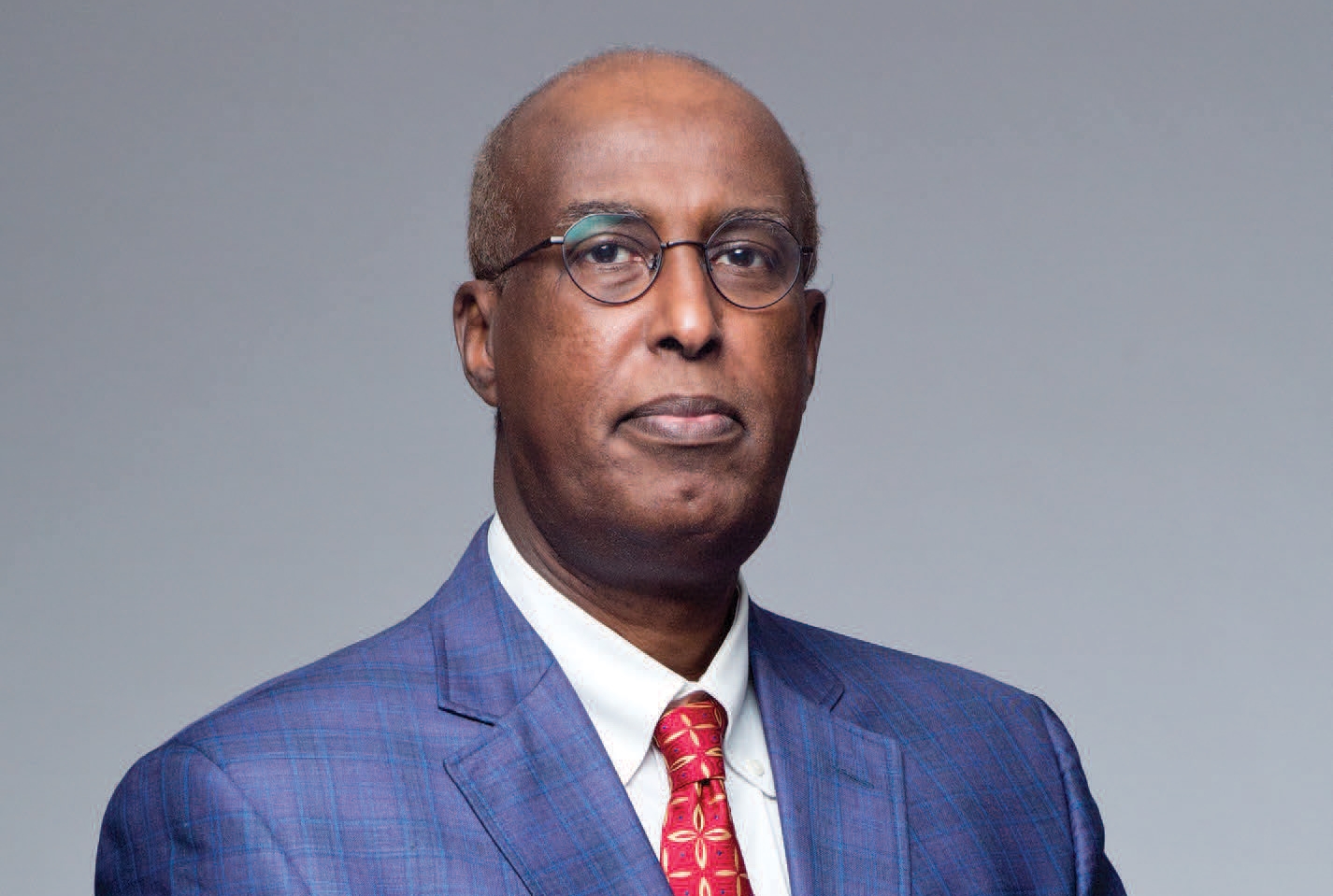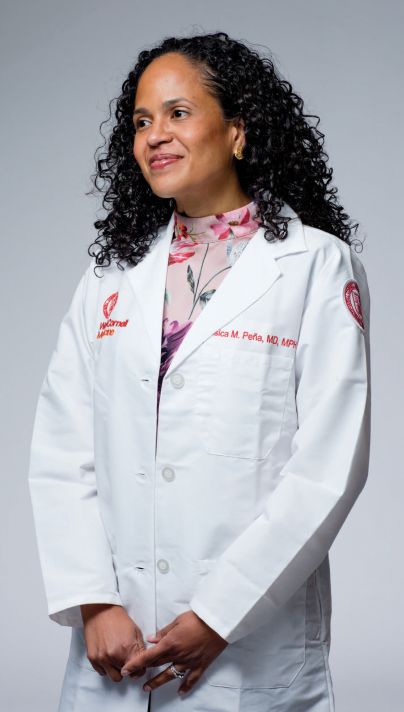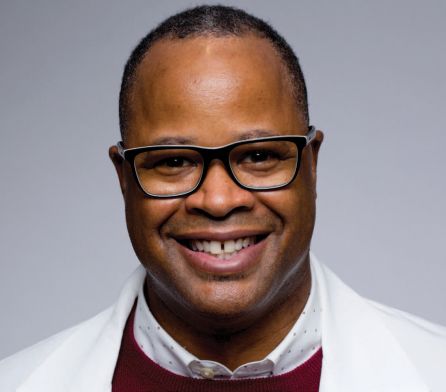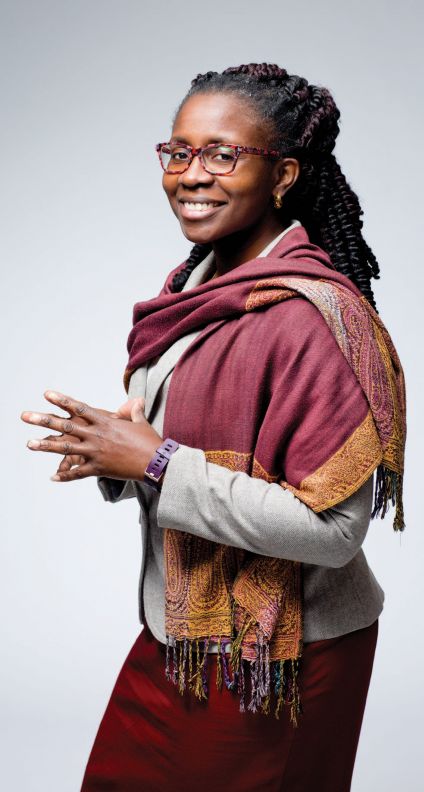
By Heather Salerno
Portraits by John Abbott
Like so many others across America and beyond, second-year medical student Chimsom Orakwue was outraged by the harrowing footage that captured the last moments of George Floyd’s life, as a white Minneapolis police officer knelt on his neck for nearly nine minutes during an arrest late last spring. Something about the protests in the wake of Floyd’s death felt different from the demonstrations against police brutality that Orakwue had marched in before. This time, the widespread civil unrest seemed to spark a deeper conversation about systemic racism in the United States and around the world, and she felt compelled to rally her classmates and colleagues at Weill Cornell Medicine.

Chimsom Orakwue '23
As president of Weill Cornell Medicine’s chapter of the Student National Medical Association, an organization dedicated to the needs of medical students of color, Orakwue helped coordinate a student-run virtual town hall last spring with fellow second-year Mercy Ude, who leads Weill Cornell Medicine’s chapter of White Coats for Black Lives. It was intended to pay homage to individuals who have lost their lives to police brutality, but also allowed the Weill Cornell community to share their experiences as people of color. They were joined by more than 200 students, trainees, faculty and staff, some of whom told emotional stories about injustices they’ve faced or witnessed, and emphasized the importance of making healthcare anti-racist. Activists argue that there’s a difference between being “not racist” and “anti-racist”—the latter denoting an active, conscious process of identifying and eliminating racism by changing policies and attitudes, acknowledging personal privilege and confronting acts of discrimination and inequality. “It was a pivotal moment and eye-opening for a lot of people,” recalls Orakwue, who was born in Nigeria and moved to the United States as a young child with her family. “I think because it was an unprecedented time with the spread of the coronavirus, people were forced to slow down and weren’t as distracted by other things. That allowed them to really listen and hear the hurt, and take a closer look at what was happening.”
Meanwhile, Weill Cornell Medicine leadership was mobilizing to address these issues. The institution has long been a leader in its commitment to diversity and inclusion; it recently won, for the third year in a row, the Health Professions Higher Education Excellence in Diversity Award from INSIGHT Into Diversity magazine, the largest and oldest diversity-focused publication in higher education, and last year it launched a pioneering debt-relief program to make medical school more accessible to aspiring doctors who might not otherwise envision medicine as a career they could afford to pursue. Yet ongoing discussions made it clear that additional change was urgently needed. Weekly virtual town halls hosted by the Office of Diversity and Inclusion throughout the spring—some of which drew up to 1,000 people—were initially begun to talk about the COVID-19 pandemic’s disproportionate impact on low-income communities and those of color, but quickly developed into a broader dialogue about inequality. The response to the student-led town hall also prompted a group of Weill Cornell Medicine’s medical students of color to submit a formal letter listing steps the administration could take to further social justice and confront racism on campus, while students in the Weill Cornell Graduate School of Medical Sciences called for similar action.

Mercy Ude '23
“This moment has provided Weill Cornell Medicine and our country with a unique opportunity,” says Dr. Augustine M.K. Choi, the Stephen and Suzanne Weiss Dean of Weill Cornell Medicine and provost for medical affairs at Cornell University. “The disproportionate effects of COVID-19 on Black and brown people and the Black Lives Matter demonstrations last summer have opened Americans’ eyes to how entrenched racism is in the very structures and institutions of our society, and to the critical urgency to dismantle it if we are to become the equitable and just nation we imagine ourselves to be. We must use the momentum of the past year to actively work against racism, including its effects on the STEM workforce and the disparate health of our diverse communities.”
Taking Swift Action
By June, Dr. Choi had announced immediate actions to ensure greater equity across Weill Cornell Medicine such as mandatory annual anti-bias training for all employees; the establishment of a committee at the graduate school that would look into instances of student mistreatment, including incidents of racial discrimination and microaggressions; and the appointment of “diversity champions” in every academic department to help develop plans to recruit, promote and retain underrepresented faculty and trainees. Since then progress has been made on a number of other fronts, including: changes to the medical school curriculum that introduce more content related to racism and social injustice and their connections to healthcare access and outcomes; increased support to pipeline programs to intensify outreach to students of color; and the creation of the Office of Institutional Equity, which is charged with investigating reports of discrimination and harassment and enhancing fairness in employment practices.
Dr. Said Ibrahim, Weill Cornell’s senior associate dean for diversity and inclusion, says that addressing these issues isn’t only about righting past wrongs; it’s also about improving public health. He notes that there’s a growing body of evidence that patients generally fare better when they’re cared for by clinicians from diverse backgrounds. “Diversity and inclusion isn’t just important because it’s morally the right thing to do,” says Dr. Ibrahim, who grew up in Somalia as one of 10 children and came to America in the mid-1980s to pursue his education. “Different backgrounds, experiences and perspectives make scientific teams better because they approach problems from many angles—and medicine and science have become team sports.”
At Weill Cornell Medicine, such efforts to address inequity are longstanding. The civil rights movement prompted the medical school to introduce new strategies to increase enrollment of Black and brown people, including a summer research program for undergraduates that was launched in 1969 as a way to give underrepresented students the experience needed to become competitive medical school applicants. Until then, only about a dozen Black people (including African Americans and international students) had graduated as doctors from the medical school since its founding in 1898, according to the 2016 book Weill Cornell Medicine: A History of Cornell’s Medical School by Dean Emeritus Dr. Antonio M. Gotto Jr. and Dr. Jennifer Moon. Each year the initiative—now known as the Travelers Summer Research Fellowship Program—offers 25 college students from underserved racial and ethnic groups or socioeconomically disadvantaged backgrounds the opportunity to work in laboratories, attend lectures, shadow physicians and gain deeper insight into the field of medicine. Since its launch, Travelers has trained more than 1,200 undergraduates from across the country; according to the most recent statistics (from 2018), nearly 83 percent of them went on to medical school.

Dr. Jessica Peña, MD '03
Cardiologist Dr. Jessica Peña, assistant professor of medicine and assistant dean for admissions, knows firsthand how transformative pipeline programs like this can be for young people of color. As a Latina high school student in Brooklyn, she participated in Weill Cornell Medicine’s Health Professions Recruitment and Exposure Program (HPREP), which gives students from underrepresented groups the opportunity to meet and learn from physicians and other healthcare professionals. Running for 10 weeks from January to March, the program started on campus in 1989 and has since been adopted at medical schools nationwide. “I was interested in science, but hadn’t really thought seriously about becoming a doctor until I saw so many medical students who were so encouraging and inspirational,” says Dr. Peña, who also took part in Travelers as a Brown University undergraduate. “It was the first time I saw people who look like me doing the same kinds of things I was interested in.”
Dr. Joy Howell—an associate professor of clinical pediatrics who oversees student service-learning, health equity community efforts, and other initiatives as assistant dean for diversity and student life—says programs like Travelers are as important now as they’ve ever been. Currently, less than 10 percent of practicing United States physicians are from groups underrepresented in medicine, yet racial and ethnic minorities will account for more than half of the nation’s population by 2050. Dr. Howell says it’s critical to increase this number, because when a patient can’t find providers who resemble them or identify with their cultural beliefs, it can threaten or compromise care in communities whose members already face higher rates of chronic disease and premature death. Studies show that when patients are of the same race as their physician, they report higher levels of trust and satisfaction and are more likely to observe healthcare recommendations. Says Dr. Howell: “We have to provide that exposure to underrepresented young people if we want to generate a workforce that more closely matches the demography of America.”
To amplify that outreach to racial and ethnic minorities, Weill Cornell Medicine has committed to increasing financial backing of campus organizations that support specific groups, such as the Black and Latino Men in Medicine Initiative (BLMiM). Over the last thirty years, there has been a significant decline in medical school matriculation among Black and Hispanic men, with a lack of exposure to medicine and a lack of accessible mentors cited as possible reasons for the drop. “Black and Hispanic males in medicine are almost an endangered species,” says Dr. Kevin Holcomb, the medical school’s associate dean of admissions, who is Black and serves as the BLMiM faculty adviser. “It’s the most underrepresented group among underrepresented minorities.” The organization began in 2016 to advance Black and Latino male faculty, trainees, and students at Weill Cornell Medicine and its affiliated institutions, and it also runs the Science and Leadership in Medicine Mentoring Program for high school and college students. “Mentorship is an essential component to professional and career development,” says Dr. Holcomb, director of the Division of Gynecologic Oncology and an associate professor of clinical obstetrics and gynecology. “Interacting with just one person can totally change your worldview.”

Dr. Kevin Holcomb
A Push for Meaningful Change
Part of Weill Cornell Medicine’s increased focus on racial justice involves a shift in its approach to educating its future physicians, with Dr. Yoon Kang, senior associate dean for education, leading the newly established Equity and Inclusion Initiative in collaboration with the student-led Anti-Racism Task Force. Dr. Kang says one area that’s often overlooked when it comes to inclusion is financial parity—which is one reason why Weill Cornell Medicine started a scholarship program last year to eliminate medical education debt for students with financial need, who are more likely to be racial and ethnic minorities. To extend that commitment to economic equity, starting this academic year Weill Cornell Medicine will cover for all students the costs of study materials and registration for the first two in a series of United States Medical Licensing Examinations that students are required to pass before they can practice medicine. Such tests are pricey: the cumulative fees for these two exams are more than $1,200. Weill Cornell Medicine is now also looking at increasing opportunities for underrepresented students to attend conferences, networking events and other activities that can boost one’s career but are often expensive. “There are many hidden costs of medical school that aren’t necessarily something you think of when you’re pursuing your dream of becoming a doctor,” says Dr. Kang, also the Richard P. Cohen, MD, Associate Professor of Medical Education. “We want to level the playing field when it comes to academic success and professional development for all students.”
Weill Cornell Medicine is also working to reframe the current medical curriculum so it addresses the historical impact of racism on healthcare disparities among patients of color; a new subunit on social justice, policy and advocacy has already been integrated into the Essential Principles of Medicine Course for first-years. Dr. Monika Safford, (MD ’86) founder and co-director of the Cornell Center for Health Equity—who for decades has studied inequalities in the provision of medical care among racial, ethnic, and socioeconomic groups—says that eliminating long-standing practices that reflect systemic bias is imperative to prevent people of color from being disregarded or misdiagnosed. For example, Dr. Safford points to a widely used test that adjusts for race when assessing a waste product called creatinine (a measure of kidney function) because the doctors who created the formula presumed Blacks generated more creatinine than patients of other races; more recent studies have found that creatinine levels fluctuate in adults regardless of race or ethnicity. Continued use of that test, Dr. Safford argues, can stall life-saving treatment for many Black patients with kidney disease.
“We have to show how pervasive these practices are throughout medicine,” says Dr. Safford, also the John J. Kuiper Professor of Medicine. “And the only way to do that is to make teaching about these root causes of healthcare disparities pervasive throughout the medical education curriculum.”

Dr. Joy Howell
Dr. Safford adds that future MDs need to have a deeper understanding of how social determinants of health—such as access to education, housing, jobs and healthy food—contribute to widespread health disparities. COVID-19 has only served to underscore these existing inequities, with Blacks and Latinos dying far more frequently than their white counterparts. After creating a registry with information from over 4,000 COVID patients seen at New York City hospitals, Dr. Safford and her colleagues are now involved with more than fifty studies using the data—some of which are examining the effect that social determinants (like neighborhood overcrowding) have on the infection rate and mortality by race and ethnicity. “What we’ve been saying for a long time is now falling on receptive ears,” she says. “We’re recognizing that the impact of these determinants on health outcomes can overshadow our medical interventions. More and more physicians are motivated to become more vocal advocates for eliminating or stemming these social influences on our patients’ health.”
A Renewed Culture of Belonging
Meanwhile, at the graduate school efforts are under way to make the learning environment more welcoming to people from diverse backgrounds. All faculty and students are now required to undergo training on eliminating unconscious bias through a module that focuses on shared values and expectations in the Weill Cornell Medicine community. Last summer’s protests also prompted the school to boost awareness of its Trainer-Learner Committee, which encourages students to report instances of mistreatment, such as behavior that disparages a student’s gender, religion, race or culture. “One of the biggest things we need in order for change to occur is the infrastructure to support it,” says Dr. W. Marcus Lambert, the graduate school’s assistant dean of diversity and student life and an assistant professor of education research in medicine. “This is going to be a lasting effort.”

Dr. W. Marcus Lambert, PhD, MS '18
Similarly, Jamal Lopez was charged with leading Weill Cornell Medicine’s newly created Office of Institutional Equity—in part to establish an investigatory body, separate from Human Resources, that examines claims of discrimination and harassment across the institution. All Weill Cornell Medicine employees are required to take an unconscious bias webinar created by the office, which also plans to release resources on topics like resiliency (how to thrive and overcome obstacles) and allyship (how to build relationships based on trust and accountability with marginalized groups), in the hope of making a more practical impact on the careers of those who are underrepsented in medicine and to underscore the myriad ways by which everyone can work to combat racism. “We’re already a diverse institution—that’s the first step,” says Lopez, who is senior director of institutional equity. “But once you get people here, you have to make sure they feel as if they belong and are included when it comes to opportunities.”
Dr. Ibrahim says the institution is taking a harder look at diversity among its faculty, too. While roughly 30 percent of students in Weill Cornell Medicine’s medical and graduate schools are racial or ethnic minorities, only about four percent of the faculty in its basic sciences departments, for instance, are from underrepresented groups. With diversity champions appointed to aid each academic chair, Dr. Ibrahim believes the implementation of plans to retain and support talented physicians and scientists of color will accelerate. “We’re also brainstorming ways to recruit more underrepresented faculty to our institution,” he says.
Chris Bourne, a fourth-year doctoral candidate in cancer immunology who is Black, agrees that boosting the number of underrepresented groups in leadership roles at Weill Cornell Medicine is key to growing a diverse medical and scientific workforce. He wants to stay in academic medicine, with the goal of running his own laboratory someday. But Bourne, who is co-chair of the graduate school’s Social Justice and Anti-Racism Task Force, says this dream is sometimes difficult to envision when there are so few role models in his field. “That’s been a major challenge,” he says. “You can’t be what you can’t see. Visibility is very important.” As for Orakwue, she’s encouraged by how much progress Weill Cornell Medicine has made in only a few months. She hopes the momentum will continue, and that the institution will push forward with its redoubled commitment to the cause. “While there is still so much to be done because this is such a huge problem to tackle, I’m excited to see what comes next,”she says. “Weill Cornell has shown that this is an issue worth fighting for.”
This story first appeared in Weill Cornell Medicine, Winter 2021
